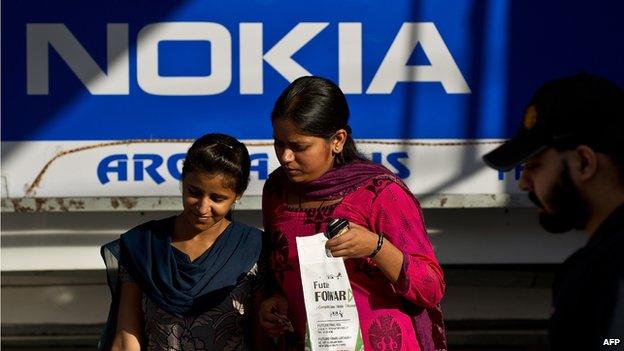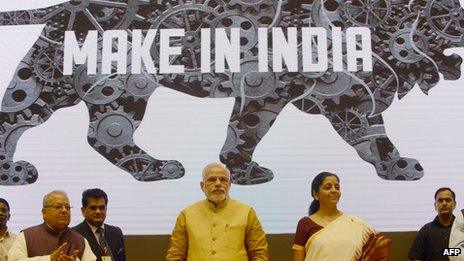Nokia to suspend production at India handset plant
- Published

Nokia's handset plant in the southern Indian city of Chennai used to be among its biggest globally
Nokia plans to suspend production at its mobile phone factory in India because of an unresolved dispute with the country's tax authorities.
The plant, once Nokia's biggest, will stop operations from 1 November.
Nokia's handset business was sold to Microsoft in April so that it could focus on its more profitable units such as network equipment.
However, the firm continued to operate its factory near Chennai city as a contract manufacturer for Microsoft.
Nokia's Indian facility has remained at a the centre of a tax dispute that began last year over the value of payments made for the development of software.
As a result, the firm has been unable to sell the factory and is now seeking international arbitration to help resolve the matter.
"The continuing asset freeze imposed by the tax department prevents Nokia from exploring potential opportunities for the transfer of the factory to a successor," Nokia said in a statement.
"In absence of further orders from Microsoft, Nokia will suspend handset production at the Sriperumbudur facility."
When Nokia sold its devices and services business to Microsoft for €5.4bn (£4.2bn) earlier this year, the transaction excluded the Finnish firm's manufacturing facilities in Chennai and Masan, South Korea.
Nokia said at the time that its India "manufacturing facility is subject to an asset freeze by the Indian tax authorities as a result of ongoing tax proceedings".
The Chennai plant had employed about 6,600 full-time workers.
Foreign investment

India's prime minister (c) is looking to attract more foreign investment through his 'Make in India' campaign
Nokia's announcement comes just weeks after India's Prime Minister Narendra Modi launched a global campaign aimed at attracting more foreign investment.
Mr Modi's "Make in India" campaign is part of an effort to get foreign firms to build more manufacturing facilities in Asia's third-largest economy.
However, many foreign firms remain wary of doing business in India because of its reputation for red tape and bureaucracy.
They have also been concerned by India's ability to impose retroactive taxes, which has affected multinational companies such as Vodafone.
The British telecoms company has been locked in a long-running legal battle with Indian authorities over allegations that it owes nearly $2.2bn in taxes over a takeover deal.
India's highest court ruled in favour of Vodafone in 2012, but the government changed the laws that same year, allowing it to impose taxes retroactively.
In May, Vodafone said it would use international arbitration to resolve the dispute.
- Published6 October 2014

- Published24 September 2014
- Published1 September 2014
